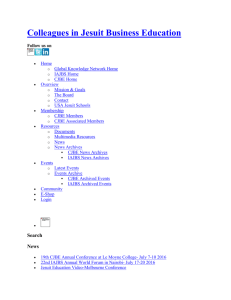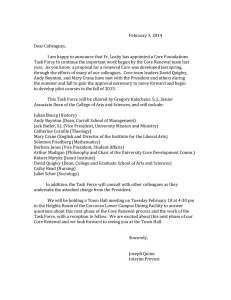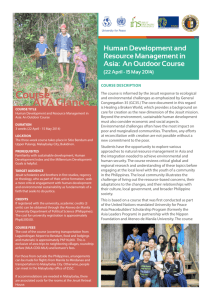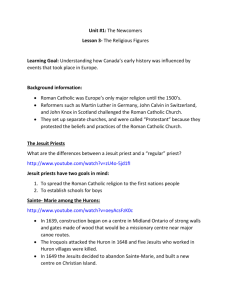Jesuit High School Profile of the Graduate at Graduation
advertisement
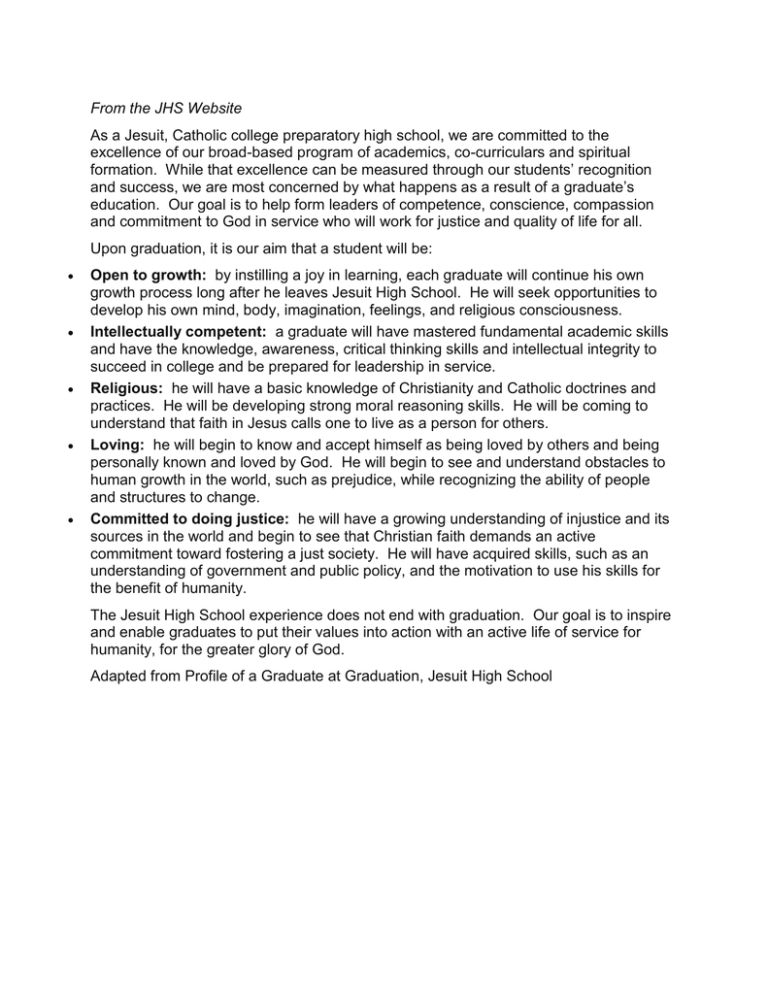
From the JHS Website As a Jesuit, Catholic college preparatory high school, we are committed to the excellence of our broad-based program of academics, co-curriculars and spiritual formation. While that excellence can be measured through our students’ recognition and success, we are most concerned by what happens as a result of a graduate’s education. Our goal is to help form leaders of competence, conscience, compassion and commitment to God in service who will work for justice and quality of life for all. Upon graduation, it is our aim that a student will be: Open to growth: by instilling a joy in learning, each graduate will continue his own growth process long after he leaves Jesuit High School. He will seek opportunities to develop his own mind, body, imagination, feelings, and religious consciousness. Intellectually competent: a graduate will have mastered fundamental academic skills and have the knowledge, awareness, critical thinking skills and intellectual integrity to succeed in college and be prepared for leadership in service. Religious: he will have a basic knowledge of Christianity and Catholic doctrines and practices. He will be developing strong moral reasoning skills. He will be coming to understand that faith in Jesus calls one to live as a person for others. Loving: he will begin to know and accept himself as being loved by others and being personally known and loved by God. He will begin to see and understand obstacles to human growth in the world, such as prejudice, while recognizing the ability of people and structures to change. Committed to doing justice: he will have a growing understanding of injustice and its sources in the world and begin to see that Christian faith demands an active commitment toward fostering a just society. He will have acquired skills, such as an understanding of government and public policy, and the motivation to use his skills for the benefit of humanity. The Jesuit High School experience does not end with graduation. Our goal is to inspire and enable graduates to put their values into action with an active life of service for humanity, for the greater glory of God. Adapted from Profile of a Graduate at Graduation, Jesuit High School Profile of the Graduate of Jesuit High School at Graduation During the 2000-2001 school year, the Jesuit High School faculty and staff created a list of “Expected School-Wide Learning Results” in preparation for the WASC accreditation process. Jesuit revised the ESLR’s in preparation for the school’s 2013 accreditation and in response to the Jesuit Secondary Education Association’s 2010 “Re-Visioned Profile of the Graduate at Graduation.” I. OPEN TO GROWTH: By graduation, the Jesuit High School student: 1. strives for integrity, commitment and excellence in all areas of life; 2. is learning to make prudent decisions to prioritize his responsibilities and to maintain a healthy balance in his life; 3. is beginning to challenge stereotypes involving gender roles, sexual orientation, race, origin, religious beliefs, intellectual or physical ability, and socio-economic status; 4. is learning to accept the talents and limitations of self and others with a sense of humility and gratitude; 5. is open to and seeks participation in a variety of new aesthetic and creative experiences; 6. is becoming open and responsive to others’ points of view, recognizing the value of listening; 7. is beginning to seek new experiences, even those which might involve some risk or the possibility of failure; 8. is developing a habit of reflection on experience which informs his future actions and is learning to accept responsibility for those actions; 9. is beginning to practice effective leadership skills, including collaborating with others and acting with integrity. II. INTELLECTUALLY COMPETENT: By graduation, the Jesuit High School student: Academic requirements: Has mastered the fundamental skills of language, mathematics, writing, reading and use of technology as required for college entrance. General skills and attitudes: 1. is developing the skills of logical and critical thought; 2. is developing written and oral skills to enable him to present his ideas in an organized, logical manner; 3. uses technology effectively, creatively, and critically to support learning, problem-solving, and communication. Substantive knowledge: Has gained an understanding and appreciation for: 1. a variety of intellectual disciplines; 2. his own and others’ cultural heritage; 3. current issues and their relationship to historical perspectives; 4. the rights and responsibilities of U.S. citizens; and 5. the development of a critical consciousness which enables him to analyze contemporary issues. III. RELIGIOUS: By graduation, the Jesuit High School student: 1. has a basic knowledge of Christianity, the major doctrines and practices of the Catholic Church, and the spirituality of St. Ignatius of Loyola; 2. is continuing to form a Christian conscience and to evaluate his own moral choices and other moral issues in light of the model of Jesus, Church teaching, and the Ignatian practice of discernment; 3. has examined his religious beliefs and his personal relationship with God in developing a commitment to a religious tradition and community; and 4. has had some personal experience of God in private and communal prayer, especially through the sacraments of Eucharist and Reconciliation, while in class, on retreat, or while serving others. IV. LOVING: By graduation, the Jesuit High School student: 1. has experienced the support of various types of community in the school and has made positive contributions to the development of the school community; 2. is increasingly mature and respectful in relating with others, especially those of a different gender; 3. is beginning to develop his love for people through serving others and is becoming more caring about life and the natural environment; and 4. is coming to recognize and accept himself as loved by God and others. V. COMMITTED TO DOING JUSTICE: By graduation, the Jesuit High School student: 1. is beginning to see that God and Christian faith demand an active commitment to fostering a just society as a “man for and with others;” 2. recognizes and has empathy for the disadvantaged segments of the community through working with them in service; 3. is beginning to identify and respond to the sources of injustice in business practices, social institutions, attitudes and customs; 4. understands the need for individual and communal stewardship of the earth and its resources; and 5. recognizes the need for a compassionate response to the victims of injustice despite the complexities and moral ambiguities inherent in social problems.
